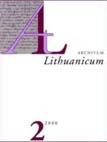Kaip Mikalojus Daukša vertė Jokūbo Vuiko naujadarus
How Mikalojus Daukša Translated Jakub Wujek’s Neologisms
Author(s): Vincas UrbutisSubject(s): Language and Literature Studies
Published by: Lietuvių Kalbos Institutas
Keywords: Daukša; translation; neologisms; Wujek; Polish language; word formation; Lithuanian; derivative; stem; borrowed word; root; morphemes; pejorative; blend; vocabulary
Summary/Abstract: The general conclusion is that Daukša at most times coped with the translation of the neologisms quite successfully. Certainly, Wujek did not cause much difficulty for the translator either: he resorted to new words only on rare occasions, and his neologisms usually did not go beyond the system of Polish word formation, and therefore were sufficiently clear and comprehensible. Translating to some extent independently rather than morpheme-by-morpheme and primarily seeking to convey the contents, Daukša, instead of searching for a similar Lithuanian derivative or coining one himself, would more often translate root morphemes: chlopczysko – vaikas 'child' (1), krwawotok – kraujo pludimas 'blood flow' (2). Only once is a loan translation found instead of one of Wujek’s neologisms: wsiarz – kieminykas 'estate owner' (7). Another option, the borrowing of a neologism into the Lithuanian translation, is encountered if there is already an identical borrowed word with the same stem: sakramentarz – sakramentorius (6) : sakramentas. Polish matematactwa (pl.) '(pejorative) astrological predictions' is a blend of the words matematyka 'mathematics' and matactwo 'trickery, fraud' as is the derivative matematacz 'one who predicts from the stars, astrologer.' Daukša translates these into Lithuanian as matematikos (pl.) 'astrological predictions' and matematikas 'astrologer' respectively. Once Polish matematacz is Lithuanized as maktematocius (erroneously for matematocius ). Wujek created an augmentative ropa 'big toad' from ropucha 'toad,' although Polish ropa ordinarily means 'pus, matter.' Daukša misunderstood Wujek's word ropa and translated it into Lithuanian as puliai 'pus.'
Journal: Archivum Lithuanicum
- Issue Year: 2000
- Issue No: 02
- Page Range: 99-106
- Page Count: 8
- Language: Lithuanian

